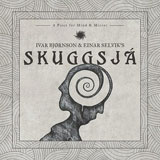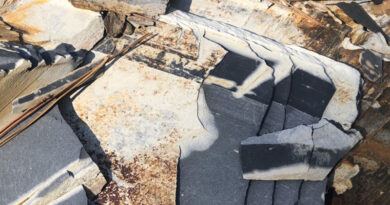Ivar Bjørnson & Einar Selvik ‘Skuggsjá’ CD/LP/DD 2016
 Forget the church burnings, the murders, that kvlt feeling when you hold your original pressing of Bathory’s ‘The Yellow Goat’ debut (a man can dream). For me, black metal’s most alluring quality is its world building. Whether they are grim and frostbitten kingdoms, mountains or woodland, the genre is fascinated by semi-fantastical places. After all, so many black metal bands have drawn from Tolkein that he could be called the first black metal artist.
Forget the church burnings, the murders, that kvlt feeling when you hold your original pressing of Bathory’s ‘The Yellow Goat’ debut (a man can dream). For me, black metal’s most alluring quality is its world building. Whether they are grim and frostbitten kingdoms, mountains or woodland, the genre is fascinated by semi-fantastical places. After all, so many black metal bands have drawn from Tolkein that he could be called the first black metal artist.
Skuggsjá, the collaboration between Ivar Bjørnson (guitarist and composer of inimitable black metal titans Enslaved) and Einar Selvik (mastermind of haunting folk ensemble Wardruna) paints rich pictures of an earlier world. Generically it sways from soaring choral pieces to lo-fi black metal riffs and arresting folk instrumentation. This is nothing new in black metal, but to categorise Skuggsjá only as black metal undermines the gravity it gives to its Norwegian heritage and its expert use of traditional instruments.
The album is a commission to recognise the 200th anniversary of Norwegian constitution and reflects upon Norwegian history (in English the title translates as ‘reflections’). Selvik has often discussed the heritage of Norway, its corruption by Christian rule and the importance of preserving pre-Christian history. Skuggsjá could be a reflection in more ways than intended. After all, the Eddic sagas that tell of pre-Christian Scandinavia aren’t preserved in their original form, but are Christian-era records. They reflect the past just as Skuggsjá reflects the past. Skuggsjá continues that Eddic tradition, a reflection of literary and historical traditions.
Skuggsjá similarly recycles folkloric and legendary narratives. Many of its tracks are like anthems, with choral harmonies and a dense wall of instrumentation punctuated by Enslaved’s signature guitars. Images of great mead-halls warmed by roaring fires, adorned with traded and captured artefacts. Spoken word and sung vocals alter the tone from stirring to solemn, like a skald in a Scandinavian court.
The evocation of dark medieval times in Scandinavia are perhaps nothing new, and it would be hard to argue that Skuggsjá bring a completely new approach. Instead they reach back to the earliest days of black metal in Scandinavia, in an age when the Cascadian school is (to the chagrin of some) increasingly taking hold. You can hear Bathory’s pounding beats, and even Fenriz’s Isengard on the instrumentation of Tore Hund.
Rop Frå Roynda – Maelt Fra Minne has a lurching, shifting rhythm that brings Wardruna’s influences to the fore. Its tribal rhythms feel otherworldly, and the black metal guitars are completely absent. More than any other this track feels like Skuggsjá is reaching into the past. Similarly, the penultimate track Bøn Om Ending, Bøn Om Byrjing is a dirge that feels ancient, using crushing guitars and a simple repeated phrase. Unfortunately that phrase gets monotonous when played over ten minutes.
Skuggeslatten uses repetition more successfully, though when it kicks in the sudden guitars sound a bit jarring. Its folky, Celtic lilt is timeless. Dual guitar/taglharpa (I hope I’m right on that one) echo each other in typical folk metal style. It transitions from a relaxed ditty to an almost-progressive (I hesitate to say ‘djenty’) rhythm and eventually frantic blast-beating and tremolo as horns peal over the chaos. Though it lacks vocals, Skuggeslatten tells a complex narrative that makes it my favourite track on the album.
This moves perfectly into the hymnal Kvervandi as aggression transitions into sombre reflection that skilfully avoids sentimentality. Kvervandi means ‘turning’ or ‘whirling,’ and its slow, steady rhythm is as implacable and relentless as the turning of time itself. Long have time and the seasons been fascinations of Germanic poets, and Skuggsjá are tapping into an ancient tradition once more. Skuggsjá talk about recreating the shifting animal interlace of Germanic art in their music, a goal which Kvervandi achieves. The steady beat could be a call to winter, or a marching anthem. Maybe having a grasp of Norwegian or Old Norse would make things clearer for me, but I like the ambiguity.
It’s been a while since an album has given me those same goosebumps I got listening to Burzum’s Hvis Lyset Tar Oss and Isengard’s Vinterskugge. The beauty of black metal lies in its ability to evoke the nuances of the past without resorting to nostalgic fawning, and Skuggsjá can stand tall in that tradition. It takes the heritage of Norway seriously, and is serious music. That isn’t to say that there is no joy to be had here – rather that, just as the title proclaims, Skuggsjá is a reflection of a past that draws upon all of Norway’s musical history, past and present, to reveal a complex, historically-rich and powerful nation.
Label: Seasons Of Mist
Band Links: Official | Facebook
Scribed by: Will Beattie


